Diane M. Johnson's Blog, page 3
January 20, 2025
Steppenwolf by Hermann Hesse — Starting the New Year with an Old Classic
And what a year it’s been so far. Less than one month in, and we’re battling devastating wildfires here in California, uncommonly freezing temperatures throughout the rest of the country, a shaky ceasefire agreement and a new political future in the United States that has a big segment of the population more than worried.
But I’m not going to get into politics. You can probably figure out where I stand on that front, and that’s all I have to say. Or if I really need to give you a hint, stop banning books and give to your local libraries.
I believe Hermann Hesse would have agreed with me. Steppenwolf takes place in Germany at a time of political turmoil, and while he doesn’t place specific focus on it, it is a time that's leading to war and fascism, and he’s not too happy about it—which may be partly why his main character Harry Haller is so depressed and planning his own suicide. And that’s the whole gist of the story. Harry Haller is depressed. He questions the meaning of his life, and life in general, and he has decided that at 50 years old, it’s time to kill himself. But then something happens—a mysterious sign over the doorway of a mysterious theater, and a mysterious woman who makes him rethink things.
This might be a good book to revisit at the Dawn of 2025… Anyway, a coworker suggested I check this book out. So, here's the extended review:
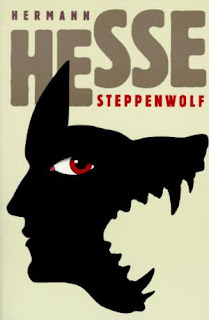
My coworker suggested I read this piece of classic literature before he finally broke down and gave it to me as a Christmas gift. Fun fact: that same Christmas, I gifted him a book too—Existentialism—A Very Short History. After reading Steppenwolf, I feel like I chose wisely.
The novel is about a man nearing fifty who ponders the meaning of life and of his own existence as an outlier/observer, and thus makes plans for his own suicide as he comes to the conclusion that people are destined to die anyway, and there is no joy to be had once you realize it. Then he comes upon a man with a sign, and a closed door to a theater that's "for madmen only." He meets an intriguing woman, Hermine—who reminds our protagonist Harry of a long ago friend named Herman, and she lures Harry into a quest to find all the possibilities of life, death, happiness and longing by living a more decadent and carefree life beyond the bourgeois lifestyle he leads and at the same time despises.
The bulk of the story is Harry resisting this path, until he doesn’t, then learning the lessons of possibilities once he gives himself over to the whims of chaos and unpredictability. Written in 1929 and set in Germany, the story suffers from some of the prejudices of its time, but I found it admirable to see it touch on current topics just the same. For instance, Herman partly falls in love with Hermine because of her resemblance to his boyhood friend Herman. And at one point, Hermine dresses like a man for the purpose of being mistaken for a Herman. So that touch of playing with gender norms is a great example of its existence—without condemnation—a hundred years ago.
If existentialism is a subject that intrigues you, then Hesse's Steppenwolf is a must for your literary shelves. It's a classic that should be available anywhere you look—even your local library.
Steppenwolf by Herman Hesse — Starting the New Year with an Old Classic
And what a year it’s been so far. Less than one month in, and we’re battling devastating wildfires here in California, uncommonly freezing temperatures throughout the rest of the country, a shaky ceasefire agreement and a new political future in the United States that has a big segment of the population more than worried.
But I’m not going to get into politics. You can probably figure out where I stand on that front, and that’s all I have to say. Or if I really need to give you a hint, stop banning books and give to your local libraries.
I believe Hermann Hesse would have agreed with me. Steppenwolf takes place in Germany at a time of political turmoil, and while he doesn’t place specific focus on it, it is a time that's leading to war and fascism, and he’s not too happy about it—which may be partly why his main character Harry Haller is so depressed and planning his own suicide. And that’s the whole gist of the story. Harry Haller is depressed. He questions the meaning of his life, and life in general, and he has decided that at 50 years old, it’s time to kill himself. But then something happens—a mysterious sign over the doorway of a mysterious theater, and a mysterious woman who makes him rethink things.
This might be a good book to revisit at the Dawn of 2025… Anyway, a coworker suggested I check this book out. So, here's the extended review:

My coworker suggested I read this piece of classic literature before he finally broke down and gave it to me as a Christmas gift. Fun fact: that same Christmas, I gifted him a book too—Existentialism—A Very Short History. After reading Steppenwolf, I feel like I chose wisely.
The novel is about a man nearing fifty who ponders the meaning of life and of his own existence as an outlier/observer, and thus makes plans for his own suicide as he comes to the conclusion that people are destined to die anyway, and there is no joy to be had once you realize it. Then he comes upon a man with a sign, and a closed door to a theater that's "for madmen only." He meets an intriguing woman, Hermine—who reminds our protagonist Harry of a long ago friend named Herman, and she lures Harry into a quest to find all the possibilities of life, death, happiness and longing by living a more decadent and carefree life beyond the bourgeois lifestyle he leads and at the same time despises.
The bulk of the story is Harry resisting this path, until he doesn’t, then learning the lessons of possibilities once he gives himself over to the whims of chaos and unpredictability. Written in 1929 and set in Germany, the story suffers from some of the prejudices of its time, but I found it admirable to see it touch on current topics just the same. For instance, Herman partly falls in love with Hermine because of her resemblance to his boyhood friend Herman. And at one point, Hermine dresses like a man for the purpose of being mistaken for a Herman. So that touch of playing with gender norms is a great example of its existence—without condemnation—a hundred years ago.
If existentialism is a subject that intrigues you, then Hesse's Steppenwolf is a must for your literary shelves. It's a classic that should be available anywhere you look—even your location library.
January 1, 2025
A Chance at Free eBooks to Ring in the New Year!
HAPPY NEW YEAR 2025
Happy 2025 to all the fans of horror. I would be negligent if I didn't let you know about the book giveaway being headed by TheStoryGraph website, so if you're a StoryGraph user you're in for a treat! Two of my eBooks are eligible for giveaways on the site until January 18th.
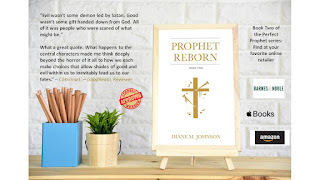
Prophet Reborn and Perfect Sacrifices are books two and three of the Perfect Prophet series, so enter to win one of fifty copies each. And if you do win, you can pick up the first of the trilogy --Perfect Prophet-- for only $1.99 at your favorite online eBook retailer.
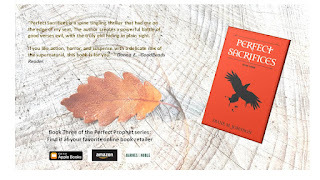 Here are the links to TheStoryGraph, and best of luck!
Here are the links to TheStoryGraph, and best of luck!Perfect Sacrifices link
Prophet Reborn link
December 15, 2024
Deep Down There by Oli Jacobs -- A Truly Clever Premise that Teases More to Come
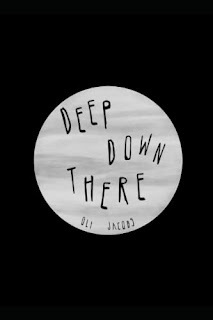 Cover Image via Goodreads
Cover Image via GoodreadsAn independently published work
Deep Down There by Oli Jacobs is an entertaining read with a simple but clever premise: What happens when a sinkhole appears in an established community. Overnight. And it’s a perfect circle with smooth walls that go straight down for what seems like infinity? The gated community of Anton Court gets to find out, and their justified curiosities lead to a few horrific outcomes.
I enjoyed this read. Oli Jacobs leans into character development to keep us interested, and he has created a nice little eclectic bunch led by Hannah, a widowed mother of two young boys who is stuck in a comfortable rut after the accidental death of her husband. Then the hole appears, and things gradually get weirder. No spoilers, but if you are a fan of TV shows like The Big Door Prize, which was a book before it was a TV series, you might like the feel of the characters here.
I do have a few criticisms on this one though. Plot development was a little bit slow for me, and the ending is left a bit too open ended, imo. There is a late revealed character that left me with more questions than answers (I can’t say more because of spoilers), and one key character seemed to have a name change through the third quarter of the book that had me scratching my head.
That all having been said, there are two post chapters that are separate from the main story but also tied to it. Ironically, they leave the reader with more questions, but they are also full of the right amount of intrigue to make this reader curious for more.
If you're down for a quick read that involves unexplainable mysteries and anomalies that might trigger the conspiracy theorist deep inside, than maybe check out Deep Down There. Click the image for a sales link.
November 10, 2024
Brave New Weird: The Best New Weird Horror, Vol. 2 — A Review
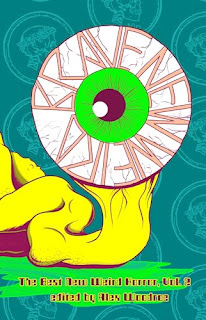 Cover image courtesy of Tenebrous Press
Cover image courtesy of Tenebrous PressClick on image for where to buy
A brave series of shorts from Tenebrous Press where tales of the increasingly weird don’t feel so outrageously impossible at the dawn of the new world we’re living in. A new world where many of the wonderful stories within it could quite possibly get it banned. That isn’t hyperbole. These stories touch on a broad range of topics from transgenderism to environmental negligence to autonomous healthcare decisions to the advancement of AI for all the wrong reasons.Which is why you should check them out, because the Brave New Weird is here and now.
Like most anthologies, not every story is going to hit you in the right way, but I didn’t find one story that was less than worthy of a 3 ( the average "I liked it" grade), with most being well worthy of 4s and 5s ("really liked it," or "best read ever!").The list of the ones that resonated most for me include:
In That Crumbling Home , by Thomas Ha—A post apocalyptic tale about a girl and a blood tree and the hope that resides in a future generation.
A Balanced Breakfast , by Eirik Gumeny—A diabetic podcaster summons a demon for an interview by casting a spell with the use of sugary breakfast cereals.
The Man Outside , by Simone le Roux—He's always present in a young girl's life, beginning at age eleven, and as she grows year after year toward adulthood, he creeps closer and closer.
As the Music Plays Groovy , by Michael Bettendorf—When the voice of reason comes from Nic Cage through your AI assistant device, maybe you should rethink things.
The Sound of Children Screaming , by Raechel K. Jones—Because the best defense in a school shooting is a portal to a different world.
Quietus , by Premee Mohamed—The quest to find meaning through the eyes of an RPG soldier.
These are by far not the only picks that I enjoyed, but they’re a good sample of what to expect. These thoughtful pieces of horror all have something to say about the world we live in now and the challenges we face in the very near future. Things to think about, things to defend in our lifetime, things to resist if we want to preserve our general humanity.And yes, I am writing this after the disappointing results of our 2024 election. But I was ready to give this book high praise before that. I find many of the stories here all the more relevant.
Click on the cover image for a direct link to Tenebrous Press, or look for the book at most online book retailers.
September 28, 2024
A Dark and Rising Tide — An entertaining creature feature by Debra Castaneda
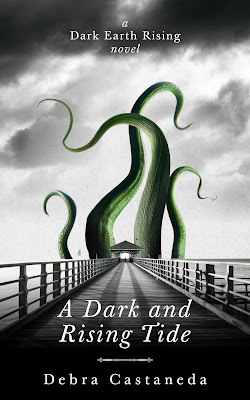 Cover image courtesy of
Cover image courtesy ofShadow Canyon Press
A Dark and Rising Tide is a well written people vs nature story, with a monster akin to those horror movies of the late 70s through 80s to boot. I’m reminded of Tremors. I’m reminded of Jaws. I’m reminded of Aliens. I’m reminded of Chtuthlu, for obvious reasons, and I’m almost certain that I’ve spelled Cthulhu wrong. Again (one is correct, according to autocorrect, so I’ll trust it—just this once).
But I digress. Back on point, this is a fun, casual horror read about ordinary people in extraordinary circumstances. Carla, a restaurant owner in a seaside tourist town, is just trying to make ends meet after the recent death of her son from a boating accident. She has regulars to her restaurant along the pier. She has a love interest in Peter, a retired lifeguard and park ranger. They make a nice couple, but Carla isn’t ready to commit due to the loss of her son.
Then a storm blows in, and the conspiracy theorist among regular patrons says there are monsters afoot. And he's right. Trapped by the storm, Carla and Peter, and a host of other small town characters are forced to deal with it. If you’re a fan of any of the classic movies that I’ve listed above, you just might like this read.
Check out this GoodReads link for where to find it, and for more reviews.
September 21, 2024
Short Story Review—Yellow Carousel by Timothy G Huguenin
Yellow Carousel by Timothy G Huguenin
I don’t often make the time for short stories unless I find them in an anthology, which is a serious demerit for me, I know. But while cleaning out my emails, which are full of read requests for award considerations, I came across this gem from a year ago, written by HWA member Timothy G. Huguenin. It's a cosmic horror piece about the regrets we have, and the past we long for as our time on this earth grows short. It ends on a decidedly weird note, and I’m not going to spoil it, but it’s worth checking out here at the website Cosmic Horror Monthly:
https://cosmichorrormonthly.com/fiction/the-yellow-carousel/
Timothy G. Huguenin is s new author to me, but after this quick read, he's one I will keep on my radar. His best known title, according to GoodReads, is Little One.
Look for more of his books here: https://tghuguenin.com/
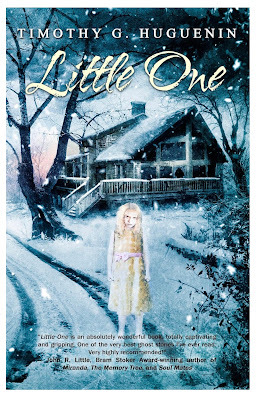 Cover Image found at GoodReads
Cover Image found at GoodReads
September 2, 2024
Horror Fantasy set in Appalachia -- Where Dark Things Grow by Andrew K. Clark
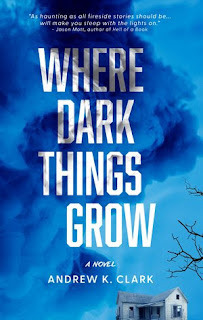 Cover image courtesy of
Cover image courtesy ofCowboy Jamboree Press
A well written YA/New Adult piece of folk horror set in Appalachia during the depression. It took me a while to get invested in this story of a rural mountain boy literally just trying to survive with his family during the Depression. Fifteen year old Leo is a meek and obedient kid from the start, trying to earn coin to help pay for necessities for the household that includes a pair of brothers, a sick little sister and a mother who has lost any hope of a better life since her no good husband up and left the family. Again.
Mama tasks Leo with the job of going into town and finding dad, who is probably wasting what little money the family has on bars and brothels. But the first third of the book is Leo avoiding this chore. Instead, he hangs with an old widow who pays him for jobs she can't do, and who feeds him stories of the danger and magic in these woods--in particular, tales of wulvers. Author Clark spends a lot of time setting Leo up as a bit of a shy loser here. Leo avoids sharing his feelings for his crush named Lilyfax, he fails to stand up to bullies, and he kowtows to preachers who are clearly questionable men of the cloth. But he also has a special gift, it seems, when we learn that he has almost a sixth sense relating to wild animals. Enter that magical creature, the Shadow Wulver.
The story picks up dramatically at this point. The connection to this mythical beast changes both Leo and the course of the story, where the wulver could become the power that Leo needs to help his family through heartbreak and hardship, or something more dangerous that both exposes and feeds off of Leo's repressed anger. This dichotomy was what made the overall story most interesting for me. It propels Leo into his real journey, to find out what happened to his dad, which plunges him into another story altogether--to find out why several young women have gone missing--many of them from that brothel dad likes to visit.
Clark could have easily made a misstep here, where the young male lead plays the hero to the helpless beautiful girl, but he manages to avoid that trap. What I'm saying, is that the women in the story are not all helpless, and that's a good thing. Whether Leo helps save anyone or becomes an unassuming participant in their demise is for the reader to find out.
Also, categorizing this book can be tricky. It has young adult characters but may be more suitable for a slightly older readership. It contains themes of rape, and domestic and sexual abuse, but Clark manages to infer these things more than showing them. And the strength of the female characters is well done. In fact, while the story mostly focuses on Leo's perspective, there are a few chapters that jump to certain female characters using a first person perspective, and those brief passages are some mighty fine writing, imo.
All in all, an entertaining read for the folkloric horror fan.
I received an advance review copy for free, and I am leaving this review voluntarily.
Find a copy of Where Dark Things Grow HERE.
August 18, 2024
Experimental Film by Gemma Files — A Slow Burn of a Gothic Tinged Folk Horror Tale.
A slow burn of a supernatural mystery that takes place in the world of film as art (and not standard storytelling), the actual storytelling can be profoundly deep at times. I feel like this piece is meant for a niche audience, and yes, I just happen to fall into that category.
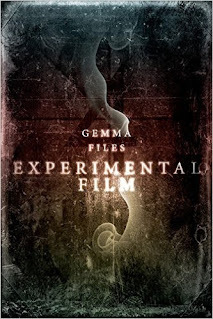 Cover Image courtesy of
Cover Image courtesy of ChiZine Publications
The protagonist is an art film historian, a student and teacher of the movement, and me, having graduated from a state school with a film degree—under the mentoring of the likes of Ken Jacobs and Ralph Hocking, felt comfortable in the environment that author Gemma Files has created.
Within that regard, this is an interesting story. You have a mother, torn between her passion for art and her special needs child Clark. Lois, the mom, finds an important discovery in the world of underground film and film history in general, when she stumbles upon a woman who was present at the start of it all, Iris Whitcomb. But because of her mysterious disappearance, after the disappearance of her own son at a young age, Whitcomb's potential mark on the history of filmmaking has been lost. That is until Lois connects some significant dots and garners a grant to suss out the entire story, and to prove it.
Lois becomes obsessed with the project, leaving the rest of the family —her mom and her overly patient husband Simon, to do the lion's share of caring for Clark. The trick here is empathizing with Lois in her quest to find the story for the sake of film history and women in film history, and I’m not sure Files pulls it off entirely. It’s important to note that the character Lois feels guilty about Clark in some ways, never feeling like Clark quite connects with her as a mom and always feeling like he is the way he is because of her own potentially neurodivergent inadequacies.
Clark, by the way is wonderfully portrayed in my opinion. And the culmination of the secondary story and of what Lois learns and accepts—because of Clark—is worth the time to tackle this otherwise slow paced read. The horror and supernatural elements have more of a haunting gothic quality rather than outright gore, so if you’re looking for a slow unraveling of creepy ambiance, this read might be for you. But solving the mystery of Iris Whitcomb's disappearance, and its connection to an ancient folktale of a goddess who needs to be seen and worshipped is the main story, and it takes time to link it to Lois's struggle with her responsibilities as a parent to Clark.
Click on the book cover above for a link to the book's GoodReads page.
August 4, 2024
Cunning Folk by Adam Nevill -- A Horror Novel about How to NOT Deal with New Neighbors
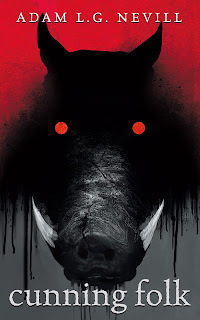 Cover Image courtesy of
Cover Image courtesy ofRitual Limited
Beware of your neighbors. They’re exactly who you think they are. That’s essentially what this book is about.
When a young, financially struggling family finds a fixer upper in a wealthier countryside neighborhood, they dismiss the previous owner's suicide to achieve the dream of being homeowners. But it’s a challenge to live next door to the most perfect estate on the street, especially when the elderly couple living there has prejudices and standards and snooty rules. Grudges build quickly, and window watching from a house that falls apart faster than it can be fixed exposes creepy WTF suspicions and revelations that build with every new peek. There is something terribly wrong with the neighbors, and their poisonous ways are seeping into the new family's back yard.
I have witnessed (and been through) enough cringeworthy neighbor confrontations and unintentional glimpses to understand the increasing madness that our MC Tom experiences. He's driven to that madness because of one niggling disagreement. Then another. And another. Each, building on the other toward a horrific end.
This book is weird. And funny. And heartbreaking. And splattery. A worthy folk horror read.
Click on the cover image above to check out more reviews on Goodreads, and to find links to your favorite bookstores.



